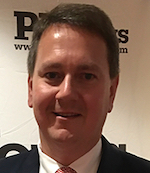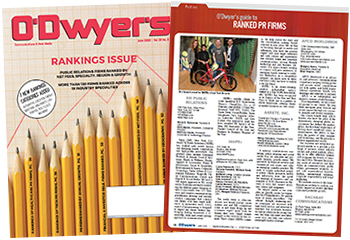 Thomas Butler Thomas Butler |
In January, our firm took on a new client, New York City’s FDNY Emergency Medical Service workforce. Looking back, the ironies are remarkable.
The FDNY EMS came to us because its message simply wasn’t resonating with the news media, nor hitting its target with the public. So, our team got to work. The original goal was that the workforce needed better positive recognition about the intensive medical training it undergoes and its status as front-line, first responders. In many New York neighborhoods, the FDNY EMS is referred to as the city’s “Street Doctors.” But like Rodney Dangerfield, “they got no respect.”
 |
| This article is featured in O'Dwyer's Jun. '20 PR Firm Rankings Magazine. |
In the six weeks that followed, we gained a lot of traction. The storylines we sought took shape and began playing out in some of New York City’s largest news and editorial pages as well as over the airwaves. It even brought forward several high-profile surrogates to stand in unity with this mostly female, underpaid and certainly under-respected workforce. We didn’t plan for a crisis with this client, but then the world changed.
That very same client, the 4,500 members of the FDNY EMS that months ago feared its lower profile had become an impediment, had now been foisted into the limelight of American heroes battling the COVID-19 pandemic.
The resources required by the agency to address various storylines and a long and winding list of news media is significant, but the client has graced most of the major network television news channels, and with frequency and repetition told its story to the New York Times, Wall Street Journal, AP, Reuters and hundreds more.
Our original goal was to highlight the vital works EMS workers do and the need for them to be better compensated. As the coronavirus struck, we entered the heat of battle—with no off-the-shelf game plan—and were able to bring that important message to a massive audience.
Similarly, in the earliest days of the outbreak—nearly two weeks before the state stay at home order—I received a call from the Co-CEOs of a prominent consumer beverage brand. Only 30-minutes earlier, they’d been notified by an employee—now in the hospital with pneumonia—that he was the first confirmed case of coronavirus in a county of 1.5 million.
This was going to be disclosed by the health department to the media first thing Monday morning. So, we had a few hours to prepare? Unfortunately, no, because at that very moment the company was hosting 150 people in its performance and restaurant space.
Together, we had to rapidly establish a plan that considered best-practices but didn’t incite irrational fear. Americans had been reading all about the tragic death toll in Italy and China, but the public didn’t have sufficient health and medical information. How then, would we or anyone address the public, confronted with such alarming news, and not cause permanent brand reputational harm?
Throughout the night and early that morning, the team prepared for a media onslaught, and for the health officials’ announcement to come. Believe me, there’s no brand that wants to be first in this type of scenario. When the announcement was made by the health department, the company addressed the media inquiries in a prepared statement from our firm, factual but not alarmist, while steadfastly protecting the privacy of the employee.
The company announced it was immediately closing to the public for several weeks, to recognize a multi-week quarantine period agreed to with the health department and to voluntarily conduct a deep sterilization of its facilities. By now, we’ve all heard about deep cleaning thousands of times over, but back then it was still news. The firm addressed every media inquiry and the coverage was fair, considering the company had the misfortune of being first. We’d battened down the hatches for the day-two narrative, and then, something unexpected happened.
That day, we received a mid-day call from the leader of the FDNY’s EMS union to notify us that it now had the first positive coronavirus case among New York’s first responders. He said, “we need to get the word out to the media now.”
If you work long enough in this business, you’ll always find a time when that big client news scoop misses, simply because a bigger news event comes along. It just so happened that on this day, the bigger, more dominant news story was also controlled by us. Within minutes, our team was conveying the EMS story to some of New York City’s biggest editors and TV news channels. Both stories got told, but because we had the size, capacity and ability to conduct a rapid response to manage two simultaneous crisis situations that day, the outcome was considered a success by both clients. This all illustrates, again, that there’s no template for a crisis.
For more than 25 years, I’ve experienced my fair share of being called in to help a corporation, celebrity, CEO or non-profit to tamp down and then pivot in a positive direction away from a crisis. Many times, I’ve suggested to various CEOs whose company reputations were marked with a bullseye, that the work we can accomplish together, when executed properly, can be a means for the brand to emerge even stronger.
In this pandemic, businesses have needed to scramble simply to survive. Despite some nerve-wracking early weeks, the fact that our firm has a significant crisis management practice and long-established work teams that mirror the operations of a newsroom, I believe has given us a greater resiliency.
Throughout this pandemic, we’ve executed crisis plans—some made on the fly—for dozens of clients in unchartered waters, regardless of their industry. The shuttering of retail locations and protection of staff or overcoming concerns reagrding layoffs. In this time, when the existence of many long, well-established brands is threatened, it’s the innovative, out-of-the box thinking that our industry is recognized for that will come out in the end. I’ve spoken with many peers in the PR, marketing and advertising side of the business and many have said their world has been turned upside down.
By this point in my career, having worked with hundreds of companies, brands, campaigns, litigations, I thought, frankly, that I’d experienced so much, including representing the FDNY’s firefighters before and after the 9/11 attacks and standing amidst the rubble at Ground Zero. But then a pandemic occurred.
***
Thomas P. Butler is President of Butler Associates Strategic Communications & PR.


 There’s a fine line between newsjacking and taking advantage, aka ambulance chasing. Our job as PR professionals is to tread it carefully.
There’s a fine line between newsjacking and taking advantage, aka ambulance chasing. Our job as PR professionals is to tread it carefully. PR firms need to be mindful of ways their work product may be protected by the attorney-client privilege whenever working with a client’s internal legal team or its external legal counsel.
PR firms need to be mindful of ways their work product may be protected by the attorney-client privilege whenever working with a client’s internal legal team or its external legal counsel. Manuel Rocha, former US ambassador and intenational business advisor to LLYC, plans to plead guilty to charges that he was a secret agent for Cuba.
Manuel Rocha, former US ambassador and intenational business advisor to LLYC, plans to plead guilty to charges that he was a secret agent for Cuba. CEO mentoring is an often-overlooked aspect of why CEOs are able to make good decisions, and sometimes make bad ones—all of which intersects with the role and duties of a board.
CEO mentoring is an often-overlooked aspect of why CEOs are able to make good decisions, and sometimes make bad ones—all of which intersects with the role and duties of a board.  How organizations can anticipate, prepare and respond to crises in an increasingly complex world where a convergent landscape of global challenges, threats and risks seem to arrive at an unrelenting pace.
How organizations can anticipate, prepare and respond to crises in an increasingly complex world where a convergent landscape of global challenges, threats and risks seem to arrive at an unrelenting pace.


 Have a comment? Send it to
Have a comment? Send it to 
No comments have been submitted for this story yet.